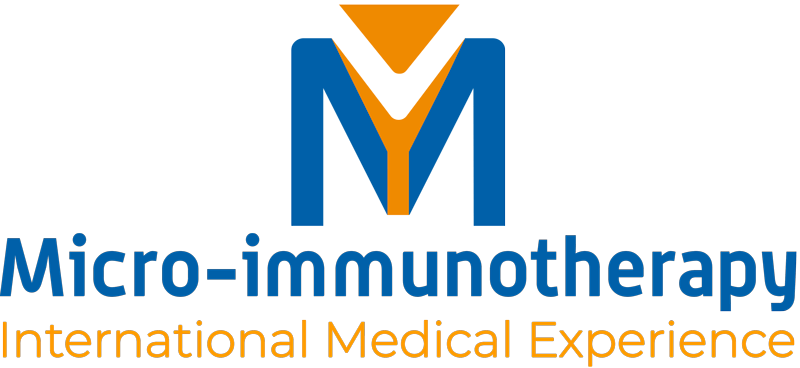(If you click on it, you will go directly to that part of the post)
The thyroid gland is an organ located in the neck whose structure resembles a two-winged butterfly. It is a vital hormone gland that is involved in growth and development of the body as well as in metabolism. But what happens when the thyroid gland permanently goes out of sync?
Before specifically addressing the topic of Hashimoto’s thyroiditis and how to recognize and treat it, let’s provide a brief overview of this important gland in our body.
Thyroid Gland
Anatomy
The thyroid gland is located below the larynx and is divided into two lateral lobes connected by a narrow strip of tissue. The upper part of the thyroid is rather elongated and narrow, while the lower part is somewhat broader and shorter.
Function
The thyroid gland stores iodine and uses it to produce the two iodine-containing hormones T3 (triiodothyronine) and T4 (thyroxine). Additionally, the hormone calcitonin is produced, which is important for bone formation, among other things. The thyroid hormones interact closely with other hormones in the body, making the thyroid involved in numerous processes. These include:
Diseases
Dysfunctions of the thyroid gland that affect the production and release of thyroid hormones generally impact various other organs and systems, including the cardiovascular system, psyche, muscles and bones, skin, and sexual function. Essentially, there are two types of thyroid dysfunctions: hyperthyroidism (overactive thyroid) and hypothyroidism (underactive thyroid).
Autoimmunity: The Body Against Itself
In the course of Hashimoto’s disease, hypothyroidism often develops because the thyroid tissue is damaged and, as a result, fewer hormones can be produced. The cause of this damage is chronic inflammation, which is due to an autoimmune reaction of the body.
Autoimmune diseases remain a puzzle for medicine. In these diseases, the body’s protective processes, which are supposed to protect us from harmful pathogens, attack the body’s own healthy tissue. In Hashimoto’s thyroiditis, for example, the body initiates inflammatory processes against the cells of the thyroid gland.
But why? The causes of Hashimoto’s are still largely unknown. The protective functions that attack the body’s own tissue in Hashimoto’s originate from the immune system. Therefore, it is suspected that an immune system disorder plays a significant role in autoimmune reactions such as Hashimoto’s. The goal of micro-immunotherapy, which will be discussed in more detail shortly, is to restore these imbalances to their natural equilibrium.
Other possible causes and risk factors include genetic predisposition, gluten intolerance, vitamin D deficiency, oestrogen dominance, insulin resistance, stress, toxins, heavy metals, chronic inflammations, and infections such as EBV (Epstein-Barr virus).
Recognising Hashimoto’s Disease: Common Symptoms and Diagnostics
The symptoms of Hashimoto’s thyroiditis can be very diverse, making it sometimes difficult to diagnose Hashimoto’s. Some patients endure a long journey of suffering before receiving a Hashimoto’s diagnosis and finally gaining certainty about the cause of their symptoms.
Common symptoms include:
In most patients with Hashimoto’s, hypothyroidism develops over the course of the disease, leading to typical symptoms such as lethargy, weight gain despite a balanced diet, low pulse, dry skin, and menstrual disorders. Less commonly, Hashimoto’s can result in hyperthyroidism. In this case, symptoms may include weight loss, restlessness, nervousness, sweating, trembling, digestive issues, and sleep disorders.
Since Hashimoto’s also affects various other organs, additional symptoms and conditions may be present in those areas.
Diagnosing Hashimoto’s thyroiditis
In most patients with Hashimoto’s, hypothyroidism develops over the course of the disease, leading to typical symptoms such as lethargy, weight gain despite a balanced diet, low pulse, dry skin, and menstrual disorders. Less commonly, Hashimoto’s can result in hyperthyroidism. In this case, symptoms may include weight loss, restlessness, nervousness, sweating, trembling, digestive issues, and sleep disorders.
Since Hashimoto’s also affects various other organs, additional symptoms and conditions may be present in those areas.
Treatment for Hashimoto’s: What Therapy Options Are Available?
Usually, the insufficient production of thyroid hormones is compensated for by taking medication. Doctors typically prescribe the thyroid hormone levothyroxine (L-thyroxine), which corresponds to the body’s natural hormone thyroxine (T4, which is partially converted to T3, triiodothyronine, in the body). Although these medications can correct the hormone deficiency, they cannot cure the autoimmune disease. Some patients do not feel well despite having regulated hormone levels. Therefore, it is important to implement individualised treatment plans for each patient. Treatments may include adequate exercise, a dietary change towards an alkaline-rich diet with fresh foods, gluten-free, and selenium and/or vitamin D supplementation.
Why Micro-Immunotherapy for Hashimoto’s Thyroiditis?
In Hashimoto’s, micro-immunotherapy provides a gentle support for regulating the immune system. Through low doses of immune mediators (e.g. cytokines, specific nucleic acids) it transmits sequential information to the immune system, aiming to re-establish balance between pro-inflammatory (TH1 cells) and anti-inflammatory mechanisms (TH2 cells). The goal is to reduce the autoimmune reaction, and thus the chronic inflammation, to the extent that tissue damage is minimised.
In many cases of Hashimoto’s, a reactivation of EBV (Epstein-Barr Virus) is also observed, which further burdens the body. In these cases a specific micro-immunotherapy formula for treating an EBV infection/reactivation can be used. With the help of micro-immunotherapy’s immunoregulatory action, the antiviral defence can be supported so that the immune system regains control over the virus, putting it back to its “dormant state” (latent phase).
According to current knowledge, Hashimoto’s is unfortunately incurable but very manageable. Especially for chronic diseases, there is a strong need for gentle treatments such as micro-immunotherapy. Since multiple complaints and diseases (multimorbidity) often occur together in Hashimoto’s patients, they frequently have to take various medications. Micro-immunotherapy can be supportive here by restoring immune function, thereby improving the tolerance to and effectiveness of other treatments. It may even help reduce their dosage.













